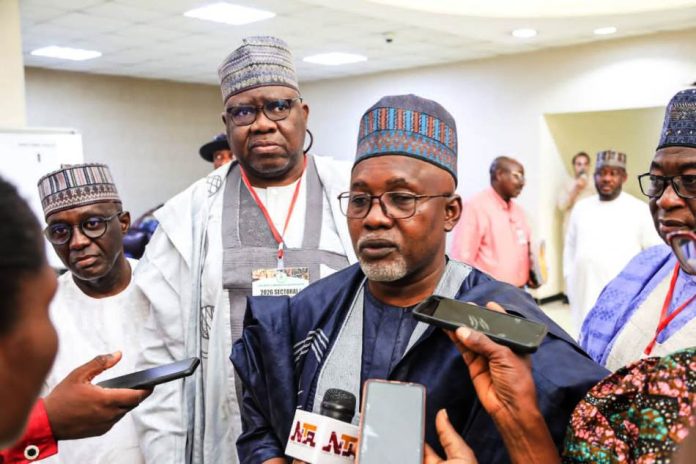
The Honourable Minister of State, Federal Ministry of Humanitarian Affairs and Poverty Reduction, Dr. Yusuf Tanko Sununu has called on the Directors of the Ministry and Heads of Agencies under the Ministry to embrace the culture of performance, purpose and progress as the Ministry implements the Performance Management System (PMS), a strategic tool designed to strengthen accountability, measure impact and align with the Federal Government’s Renewed Hope Agenda.
Speaking at the two-day 2025 Sectoral/Ministerial Retreat on Performance Management System held in Suleja, Niger State, Dr. Sununu emphasized that the Ministry is not just another Government Institution, but a lifeline for millions of Nigerians. He urged the participants to see their roles as pivotal to transform lives and ensure that government interventions reach the most vulnerable citizens effectively and sustainably. ” Our meeting here is about performance, purpose and progress. The Federal Ministry of Humanitarian Affairs and Poverty Reduction must be seen as a beacon of hope and a vehicle for change. It is not enough to hold meetings or develop concepts, what truly matters is the number of lives we uplift and the measurable impact we create”.
The Minister of State said performance in the humanitarian sector must go beyond mere effort to measurable outcomes.
“We cannot continue to measure success by how many meetings we hold or how many reports we write. A high performing Ministry cannot afford to be satisfied with effort, we must demand measurable outcomes. The true measure of our success is how many families we lift out of poverty, how many livelihood we rebuild and how effectively we strengthen community resilience”.
He explained that the new PMS is not an administrative formality, but a strategic framework that establishes a direct line of sight between the Ministry’s objects, the 8-Point Agenda of President Bola Ahmed Tinubu’s Administration and the mandates of every department, Agency and Staff member.
The Minister outlined 3 core pillars that will guide the Ministry’s performance culture which include; Clarity of purpose and Key Results – shifting focus from job description to clearly define Key Performance Indicators (KPIs) and Key Result Areas (KPAs); Continuous Engagement and Feedback – building a culture of coaching, feedback and mentoring rather than annual appraisal and Reward for Excellence and Accountability for Gaps – ensuring a fair, transparent and merit based reward system that recognizes and celebrates exceptional performance.
Dr. Sununu further notes that supervisors must become coaches and mentors providing timely and constructive feedback that empowers staff to take ownership of results. He quoted that, “A successful Performance Management System (PMS) is not a once a year form filling exercise. It must be continuous, supervisors must guide, not judge. They should support their teams to seek clarification, suggest improvements and drive results”.
He concluded by reaffirming the Ministry’s commitment to institutionalizing a result -driven and transparent performance culture that delivers tangible benefits to Nigerians.
Earlier in his welcome address, the Permanent Secretary, of the Ministry, Yakubu Adam Kofarmata, PhD, called on the participants to fully embrace the PMS as a central tool for renewing and repositioning the Civil Service towards improved delivery of Humanitarian and poverty reduction interventions.
Dr. Kofarmata emphasized that the Renewed Agenda of the Federal Government requires a Civil Service that acts, performs and delivers differently. To implement the Renewed Hope Agenda, the Civil Service must revolve and operate differently. “This retreat provides us an opportunity to translate our strategic goals into measurable outcomes that can be tracked, monitored and improved.
The Permanent Secretary recalled the institutionalization of the PMS which began with the signing of Performance Bonds between the President and Ministers – cascading down to Permanent Secretaries, Directors and ultimately every officer in the service. He noted that this marks a new era of accountability and service delivery within the Federal Civil Service.
He further noted that the PMS is a key pillar of Federal Civil Service Strategy and Implementation Plan 2025 (FCSSIP 25) describing it as a mechanism through which Ministries, Department & Agencies (MDAs) will demonstrate tangible results and accountability to both the Government and the Nigerian people.
Dr. Kofarmata added that,”the PMS is not just a formality, it is our collective means of demonstrating results for Mr. President, for the Ministry and for the Nations. This retreat is an opportunity to align our strategies, sharpen our focus and deliver measurable impact to millions of Nigerians who depend on our interventions”.
The PS urged the participants to use the retreat to engage in meaningful discussions, exchange ideas and develop homegrown approaches that will make the Ministry a model of efficiency and results – driven governance. He reminded participants that their responsibilities extend beyond administrative duties, stressing that their work directly impacts millions of vulnerable Nigerians whose survival and well-being depend on effective humanitarian and poverty reduction programmes.
The Director Planning, Research and Statistics, Oyinloye Adeola Meshack, set the Agenda for the retreat. Three paper presentations were made on the overview of Presidential Priorities and Operations of the Ministry; Overview ofFCSSIP/ FMHAPR PMS current Status and Expectation as well as Whole-of Go Approach(WOG)/ Cascading FMHAPR Deliverables to all levels of Accountabilities, delivered by staff of the office of the Head of Civil Service of the Federation (OHCSF) and the Central Results Delivery Coordination Unit (CRDCU).
Participants of the Retreat include Heads of Agencies under the supervision of the Ministry and Directors of the Ministry and it’s Agencies.
Signed
Iliya Rhoda Ishaku
Director, Information & Public Relations





